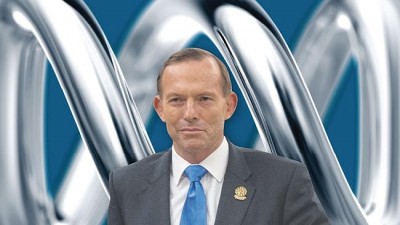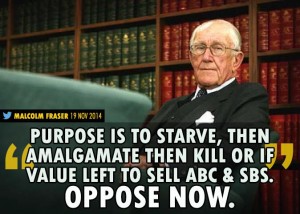The Schism and the ABC

The ABC and SBS provide tangible
social benefits to Australia and contribute hugely to our cultural and
intellectual life, writes Loz Lawrey. But because they aren’t profit-driven, they don’t fit nicely into conservative ideology.
Does the language used by those who speak for the Abbott government
make you ill? Physically nauseous? Rhetoric can do that. You’re probably
what they call a “leftie”, the term conservative neoliberals use for
people who don’t subscribe to their dog-eat-dog worldview.
Those of us tarred with the “leftie” brush tend to see the world
through a different prism to those on the far right, where belief and
ideology often carry more weight than evidence-based analysis. We tend
to care about our fellow-citizens and demand measured decision-making
based on documented fact. Our aspirations encompass fairness, social
justice and inclusion for all.
These concepts, which we regard as absolute necessities in a healthy
democracy, are often dismissed by the right as cheesy socialist
idealism, the naïve language of dreamers.
On social media platforms, when progressives and conservatives try to
communicate, what begins as civil discussion quickly breaks down and
turns into mutual vilification. This is why we tend to gravitate to
groups of the like-minded, where our views are supported and encouraged.
We like our feathers stroked, not ruffled.
Consensus is an impossible dream as long as those trying to reach it
hold opposing views of the world, or the world they would like to see,
and base their arguments on differing and often contradictory premisses.
It is clear that any debate about the future of our government-owned
media group the ABC and the hybrid-funded SBS is constantly subverted by
diametrically-opposed and irreconcilable views of what these
organisations actually are, what their purpose is and what they should
be doing.
The conservative view is that they are businesses in pitched
competitive battle with other privately-owned media outlets. So the
argument from the right tends to go: “They’re businesses, so the
government should privatise them. It’s not the job of government to run
businesses”.
This very limited vision implies that the ABC and SBS exist solely
for the purpose of making money. Naturally, those running the
privately-owned broadcasting media share this perspective – they see the
taxpayer-owned platforms as stealing their viewers, listeners and
readers. In other words, as their competitors, stealing their income.
The progressive viewpoint is that the ABC and SBS are not businesses
by any definition. They are community service-providers. They are not
profit-driven organisations, but rather were created to serve Australian
society by educating, informing and entertaining our citizens. They
are, and should remain, taxpayer-funded services. The fact that some
taxpayers are disengaged and unappreciative of the benefits of
properly-funded public broadcasting shouldn’t play into this debate.
It’s as simple as this: the ABC and SBS provide tangible social
benefits to Australia by their very existence and contribute hugely to
our cultural and intellectual life.
The social awareness that becomes a possibility when governments
support the arts and the exchange of ideas is an asset to the country as
a whole, whether people choose to avail themselves of that awareness or
not.
This is why all taxpayers should be pleased to contribute to the
funding of healthy independent public broadcasting. It quite simply
makes our country a better place, a place with a raised awareness and
hopefully, a heightened social conscience.
It could be argued that the function of taxpayer-owned or
partly-owned media has nothing to do with profit-making, rather that the
charter of these organisations is to raise the consciousness of the
nation by teaching our children and involving our adult population in an
ongoing national conversation while keeping us informed. In other
words, smartening-up the country and acting as a cultural facilitator.
Making things better, and making Australia a better place to live in for
ALL its residents, bar none.
Profit-driven media share no such lofty aspirations. Here the focus
is on attracting passive viewers to absorb and assimilate the endless
stream of mind-numbing advertising which is commercial media’s bread and
butter.
So here it’s about dumbing-down, not raising up. It’s not about
serving the consumers, it’s about using them to extract financial
profit. People who submit to exposure to privately-owned broadcasting
allow themselves to be mentally herded like sheep, to be manipulated by a
form of social engineering controlled by money-men.
It’s true that neoliberal rhetoric tends to reduce every issue to the
level of money: “Does it make a quid?” If it does, it’s seen to be of
value.
So when progressives say “This is a wonderful organisation that
delivers measurable social dividends for the Australian community”, the
conservative response tends to be: “Yes, but does it make a quid?”
The Abbott government sees government itself as a business, hence the
ongoing obsession with budget surpluses. If a surplus is achieved,
money has been made and the “business” has proven itself successful. A
budget deficit implies business failure. In the mind of the Coalition,
“government” means “corporation”.
Opponents of the conservative regime paint a different picture of
what government should be: a system-operating body that exists to serve
the people who installed it by responding to their needs domestically
and representing them fairly and equitably on the world stage.
In this context, what does a little debt matter when good outcomes
are being achieved? Surely good outcomes, not financial gain, are the
objective. Success and failure are measured on a different scale
altogether, a scale which measures social benefits rather than profit
margins. Clearly, in this view government is not a business, rather the
clerical administrator of the nation.
Taking care of the nation’s affairs is not the enterprise of a
business. Sure, the books need to reconcile and balance, but that is not
the end in itself. A nation has no need to turn a financial profit.
It’s not about the economy (although that needs monitoring), it’s about
the people.
The schism between worldviews highlighted by the Abbott government’s
assault on public braodcasting, underpins every argument between the
political right and left and sabotages all attempts to find consensus on
desirable outcomes.
Perhaps we need to revisit our definition of “government”. One
accepted definition is that government is the system by which a state or
community is governed. This means that those “in government” at any
time are there to administer the affairs of the nation by maintaining
law and order, funding infrastructure as needed and serving the needs of
its citizens by acting in the public interest, while upholding social
justice and human and civil rights.
No argument there from either side, you may say. But this is where
perspective comes into play and rhetoric can skew the debate. The two
sides of politics have differing interpretations of what it means to
govern. The perspective of those on the right begins from the premiss
that people are stupid and that to govern means to control the populace,
while those on the left start from the assumption that we’re not stupid
and that to govern means to serve the populace.
With regard to the ABC and SBS, perhaps both sides need to align
their assumptions before engaging in the funding debate. What is
shocking to many ABC supporters is that those who are baying the loudest
for its blood see it as a burden on the taxpayer rather than the iconic
avatar of Australia’s consciousness that it has always been.



No comments:
Post a Comment